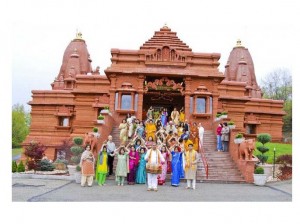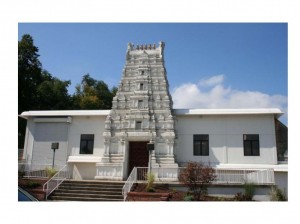By Ramita Balu
Ramita is a high-school senior at Ellis School and lives in Murrysville, PA.
 When your relatives from other cities visit Pittsburgh, do they ever mention how well you relate to your heritage, culture, and religion? Though much of my family comes from regions such as New Jersey, D.C., and Boston, with much larger Indian population, I receive this reaction quite often. What makes Pittsburgh special? We learn about our culture through the lens of Pittsburgh’s Hindu temples, in the midst of a welcoming and supportive community. While we live almost 8,000 miles from our home country, we are able to celebrate our traditions and customs because of the temples. For this reason, we must acknowledge the very early immigrants from India for creating two of Pittsburgh’s most unifying Hindu cultural centers.
When your relatives from other cities visit Pittsburgh, do they ever mention how well you relate to your heritage, culture, and religion? Though much of my family comes from regions such as New Jersey, D.C., and Boston, with much larger Indian population, I receive this reaction quite often. What makes Pittsburgh special? We learn about our culture through the lens of Pittsburgh’s Hindu temples, in the midst of a welcoming and supportive community. While we live almost 8,000 miles from our home country, we are able to celebrate our traditions and customs because of the temples. For this reason, we must acknowledge the very early immigrants from India for creating two of Pittsburgh’s most unifying Hindu cultural centers.
Indians immigrants seemed to thrive in Pittsburgh. Many rose to reÂsponsible positions in hospitals, companies, and universities, bolstering the fields of science and medicine in Western Pennsylvania. However, their success was tempered by a feeling of disconnect—they encountered an acute change in climate, differences in clothing, scarcity of familiar foods, and a society and lifestyle that they knew little about. Most of all, they missed their families and the tight-knit communities which they were accustomed to back home.
Immigrants’ discomfort translated into fear for their children. They were concerned by the challenge of raising their children in the Hindu culture without a supportive Indian community. For this reason, Indians began to gather at the only Indian grocery store in Pittsburgh to perform pujas and watch dance performances. Recognizing that religion and Indian culture often go hand in hand, this group recognized the need for a Hindu temple.
Because the original group comprised of a diverse regional and religious mixture of Indians, out of it grew the Hindu-Jain Temple, Sri Venkateswara Temple, and few other religious establishments. Both temples fostered stable and supportive communities, which provided Indians with a sense of identity in America. The temples served as more than places of worship—they preserved the cardinal values of Hindu culture to ensure that future generations appreciate and nourish their heritage.
As the temples evolved, so did their programs for cultural youth immerÂsion. Today, both temples host youth camps, Sunday school classes, dance & music lessons, and humanitarian youth organizations. While temples in many other cities have similar programs, there is something quite unique about those in Pittsburgh. Because Pittsburgh is a small city, the temples have allowed youth to interact on a very personal level. When children realize that there are other Indians who have similar families, interests, and daily struggles, they immediately assume a new sense of identity. By learning about our culture whilst surrounded by friends, Indian youth find that their heritage is valuable and meaningful.
We, as youth, are so blessed to have easy access to Pittsburgh’s Indian community and cultural amenities. It is imperative that we take advantage of this fortune by getting involved in what our temples have to offer—take a Sunday school class, attend temple camp, join a youth group, volunteer at the temple! The possibilities are almost unlimited. This will not only give us a chance to understand our heritage, but also to uphold, nourish, and preserve our performing arts and our tight-knit community


